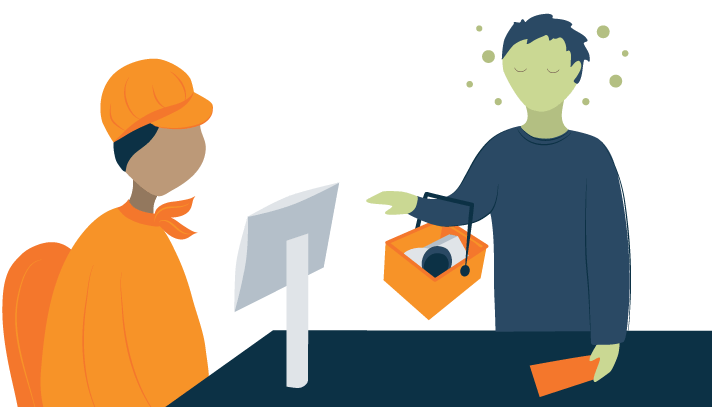This article was expert reviewed by Dr. Loy Anderson M.D.
It’s normal to feel lethargic or sleepy when you’re sick, and research shows that this is an essential survival mechanism in animals, including humans.
Not only is feeling sleepy a natural response to the energy your body is spending fighting off an illness, but it is also a protective one. When our bodies slow down into a more restful state or, even better, into a sleeping state, we are better able to heal what ails us.
But why exactly is this the case? What is happening in our bodies when we rest while sick? In this article, we’ll talk about what exactly causes us to get sleepy when we’re sick and why it is so important to listen to your body in these moments and rest.
Reasons Why You’re Sleepy When Sick
Sleep1 allows the body downtime to restore cells and repair tissue; and it works to help the brain consolidate memories, process information, and learn. This is true when we’re in top condition, but when we’re sick or even overly stressed, sleep is even more important.
When you’re sick, your body is under stress — or more specifically, your cells are under stress2. Your desire for extra sleep when you’re sick, then, is your body’s way of allowing it time to restore those cells to a healthy state so that you can recover from your illness.2

The majority of this healing and restoration3 takes place during slow-wave or deep sleep. Deep sleep also has direct ties to the body’s immune system4. The more deep sleep you get, the stronger the immune system seems to be.
How Sleeping Fights Sickness
You Don’t Use Up Extra Energy
When the body is fighting off an infection, it uses more energy in the form of calories5. This means that when you’re sick, your Basal Metabolic Rate (BMR) increases as the body tries to maintain your body temperature and fight off the infection.5
If you’re expending extra energy by maintaining your regular lifestyle – perhaps exercising or working – you’ll be “spending” important calories (energy) that your body actually needs for fighting off the illness.
The more energy you conserve when you are sick, the more resources your immune system has to help you recover faster.
Less Exposure to Bacteria and Germs
Our innate survival mechanism tells us that it’s dangerous to go out into the world when we’re not feeling well. The same is true for other animals, including our pets – when sick, they tend to hide6 or refuse to go outside.
On a biological level, we know that when we are sick, we are in a weakened state and would be less able to defend ourselves or run from a predator.
Even though humans are not likely to encounter an attack, our bodies know that it is safer to stay home and rest.
Manages Cortisol and Stress Levels
Cortisol7 is a hormone produced in the adrenal glands. Consistently high levels of cortisol, which is often caused by stress or a lack of sleep, can lead to increased inflammation and a weakened immune system.7
With that knowledge in mind, getting enough quality sleep when you’re sick, then, should help prevent elevated cortisol levels and aid the healing process.
Reduced Pain Sensitivity
The body’s endogenous opioid system8 regulates several functions, including pain relief, stress resilience, cardiovascular production, food intake control, feelings of euphoria, and more. Poor sleep can impact9 the endogenous opioid system, making the body more sensitive to pain and stress. Conversely, getting more sleep should help the body to better regulate pain and stress – two important components of feeling better when sick.
Learn more: The Relationship Between Sleep and Pain
Antioxidant Production
Research10 shows that sleep plays an important role in the production of antioxidants in the body. Antioxidants are chemical properties that help curb free radicals in the body. In other words, they help repair DNA11, maintain the health of cells, and reduce oxidative stress.
People who consistently get less sleep have lower levels of antioxidant defenses and are more likely to get– or remain– ill.10
Frequently Asked Questions
Can you oversleep when you’re sick?
You should feel free to rest as much as your body needs to when you’re sick. Often, people tend to sleep the most during the first couple of days of feeling sick. As long as you wake up to hydrate periodically, and listen to your body’s needs, we think you’ll be perfectly okay.
What sleeping position is best for cold sufferers?
People with a cold should make sure their head and nasal passages are elevated. Back and side sleeping are both suitable positions, but we recommend propping your head up with a wedge pillow to help you breathe easier.
Learn More: How to Sleep With a Cold
Conclusion
When we’re sick, it’s easy to try and power through, however, feeling extra sleepy during this time is perfectly normal, and more importantly, good for healing. When you rest when you’re sick, you’re conserving vital calories that can then be spent fighting the illness, and when you sleep, you’re allowing the body to repair, boost your immune system, produce antioxidants, and reduce stress and pain.
Therefore, when you’re fighting an infection, one of the best ways you can speed the healing process is to get plenty of sleep and listen to your body when it’s telling you to slow down.

Jill Zwarensteyn
Editor
About Author
Jill Zwarensteyn is the Editor for Sleep Advisor and a Certified Sleep Science Coach. She is enthusiastic about providing helpful and engaging information on all things sleep and wellness.
Combination Sleeper
References:
- Brinkman, Joshua E., Reddy, Vamsi., Sharma, Sandeep. “Physiology of Sleep”. National Library of Medicine. Last modified April 3, 2024. https://www.ncbi.nlm.nih.gov/books/NBK482512/.
- “What Causes Sleepiness When Sickness Strikes”. Penn Medicine. https://www.pennmedicine.org/news/news-releases/2017/january/what-causes-sleepiness-when-sickness-strikes#:~:text=During%20sickness%2C%20cells%20are%20under,recover%20from%20the%20cellular%20stress. 2017.
- Besedovsky, Luciana., Lange, Tanja., Haack, Monika. “The Sleep-Immune Crosstalk in Health and Disease”. National Library of Medicine. https://pubmed.ncbi.nlm.nih.gov/30920354/. 2019.
- “Creating Better Sleep Habits to Strengthen Immunity”. UC Health. https://www.uchealth.com/en/media-room/covid-19/better-sleep-habits-to-strengthen-immunity. 2020.
- “Energy Balance and Metabolism Module Script”. Minnesota Department of Health. Last modified January 24, 2024. https://www.health.state.mn.us/docs/people/wic/localagency/training/nutrition/modules/basicmod3/bmod3_script.pdf.
- “Why Do Pets Hide When They’re Sick?”. Willowbrook Veterinary Clinic. Webpage accessed August 1, 2024. https://willowbrookvetclinic.com/why-do-pets-hide-when-theyre-sick/.
- “Cortisol”. Cleveland Clinic. Last modified December 10, 2021. https://my.clevelandclinic.org/health/articles/22187-cortisol.
- Shenoy, Saraswati Satyanarayan., Lui, Forshing. “Biochemistry, Endogenous Opioids”. National Library of Medicine. Last modified June 20, 2022. https://www.ncbi.nlm.nih.gov/books/NBK532899/.
- Campbell PhD, Claudia M., Bounds, Sara C., et al. “Individual variation in sleep quality and duration is related to cerebral mu opioid receptor binding potential during tonic laboratory pain in healthy subjects”. National Library of Medicine. https://www.ncbi.nlm.nih.gov/pmc/articles/PMC4104524/. 2013.
- Teixeira, Kely R. C., dos Santos, Camila P. et al. “Night workers have lower levels of antioxidant defenses and higher levels of oxidative stress damage when compared to day workers”. Scientific Reports. https://www.nature.com/articles/s41598-019-40989-6. 2019.
- “Antioxidants”. Harvard T.H. Chan School of Public Health. Webpage accessed August 1, 2024. https://www.hsph.harvard.edu/nutritionsource/antioxidants/.
